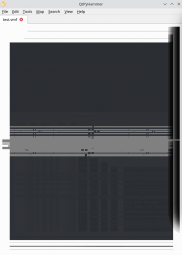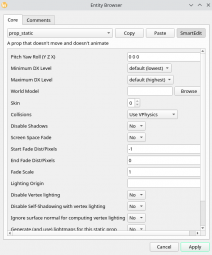QtPyHammer (Strubium): Difference between revisions
Jump to navigation
Jump to search
m (→Features) |
m (→See also) |
||
| Line 41: | Line 41: | ||
== See also == | == See also == | ||
*{{qtpyhammer| | *{{qtpyhammer|1}} | ||
*{{hammer| | *[[Lambda Level Editor]] | ||
*{{hpp| | *{{hammer|1}} | ||
*{{hpp|1}} | |||
== External links == | == External links == | ||
Revision as of 01:15, 1 May 2024
| QtPyHammer (Strubium) | |
|---|---|
| Type | Open source Third Party Tool |
| Developers | strubium, QtPyHammer Devs |
| Engine | |
| Platforms | |
| ← | |
Strubium's QtPyHammer is a modified fork of ![]() QtPyHammer, an alternative open-source
QtPyHammer, an alternative open-source ![]() Hammer for the
Hammer for the ![]() Source Engine written in
Source Engine written in ![]() Python. This fork adds features that make it a full-fledged editor.
Python. This fork adds features that make it a full-fledged editor.
Features
This fork has all the features of QtPyHammer.
New Features
- Map View and Map Operations toolbar (Unfinished)
- New popup system, replacing Python's command line.
- Texture Browser (Unfinished)
- Compile Menu (Unfinished - Nearly Done)
Planned Features
- 2D View
- Textured View Mode
- Support for language translations
- Hammer Object Properties dialog properly saving data
- Multi-language system
Usage
Todo: It is important to include instruction about configure a myenv there?
There are no downloads released yet, but you run the program by:
- Downloading the source code from GitHub
- Install all dependencies for environment by using
pip install -r Requirements.txt - Running

hammer.pywith Python installed.

